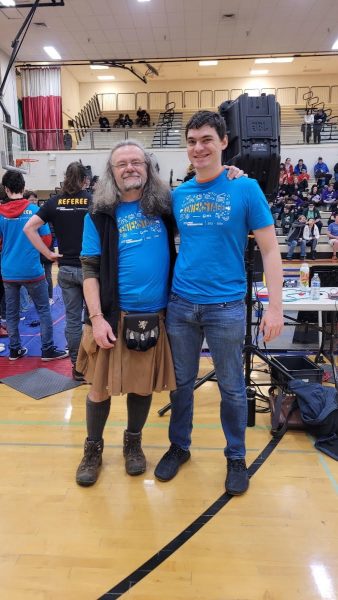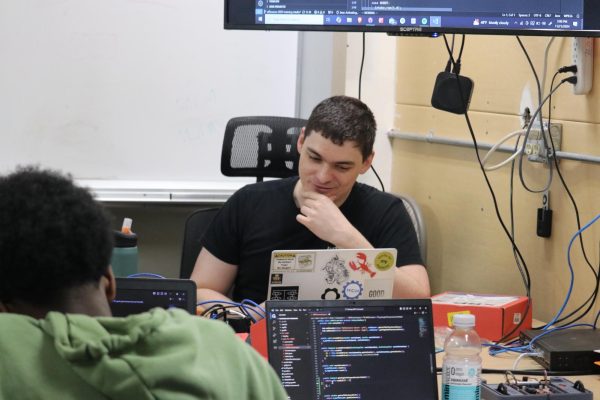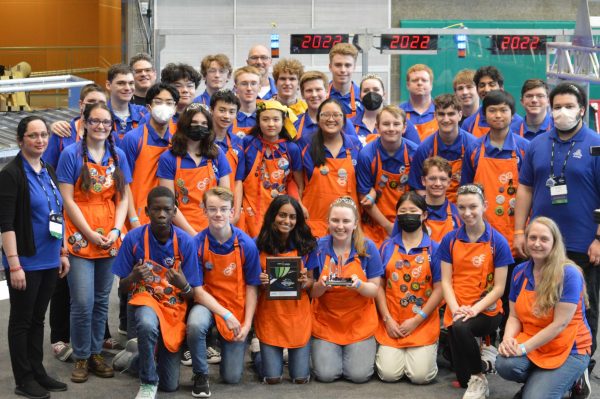Mentoring Bellarmine’s robotics team has been an incredible journey for myself and the great students I’ve mentored. When I first came back to the team, we were still in the lockdowns trying to keep the kids involved, engaged, and maintaining the values of our program. Going a few years forwards to the present day, we’ve come off from our best season yet after working our collective butts off, handily winning our first competition, getting our first ever Autonomous award, and putting up a great performance at the world championships.

Coming back to mentor Bellarmine’s robotics team was in some ways the result of the random chance of the Covid pandemic transforming mine, and the work of many others, into a remote affair. With this, I had an opportunity to give back to the school that gave me so much. As a student, I had my ambitions though they were limited by our funding, equipment, and mentor availability. I’ve wanted to, as a mentor, give students the opportunities I didn’t have to take up something hard, get good at it, and use those skills to help propel the team forwards.
This leads into my first years mentoring during the in person seasons. As a new mentor I was heavily learning alongside the kids, an interesting experience that changed my expectations of what a mentor is and should be. A wise man once said “a good mentor is willing to admit that they don’t know something” and I learned that in spades, along with the skills to better figure things out. In 2022, we designed, built, and programmed our first turreted shooter; with a lot of problem solving, planning, and hard work my students and I were able to nail it, gaining an event win and making one the best shooters in the PNW. In 2023, we did the same with implementing swerve drive, trust me, it’s complicated, as well as a 3 degree of freedom arm on a turreted base; with that, after a lot of problem solving and refinement we earned an event finalist and made it to the world championships.
Coming into 2024, we were motivated and hungry to push ourselves further than we ever had before. We aimed to not only make it to worlds but also to be a first pick in the draft for the elimination round. In order to do this we needed to create our most ambitious robot yet, able to do every task for that year’s game at a high level of performance.
The students and I worked through our 6-week build season as hard as we could, designing, implementing, and testing our code. We spent countless late nights at the practice field refining our autonomous routines. We poured hours upon hours fine tuning each and every mechanism. Coming into our first competition, we were nervous but as the first few qualifying matches were played, we settled into the understanding that our hard work was paying off as we handily won match after match.
This led into the eliminations draft where we were the first pick for the whole event and by the only other team with a better performance record than us there. We thought it would be smooth sailing from there until our robot ran into theirs and broke a key component in the first finals match. We scrambled to fix it and barely made it to our 3rd round match to secure the victory. Those opportunities to rise to the occasion are what I enjoy about being a mentor. Being able to foster our students to push themselves to contribute to a team beyond what they thought they could.

This year’s season in many ways follows that pattern of being good until a major issue arises. As the competition season continued, we realized that we pushed ourselves and the students further than we could sustainably handle and had a lot of burnout. It’s not easy to maintain the hours we put in that season; I calculated that I was regularly putting in 40 hours a week into robots alone and not everyone can maintain that for long. We had to deal with stress, personality conflicts, and personnel limitations as we dealt with further expanding our robot’s capabilities. Luckily, we persevered and were able to make it to worlds after, a district championships that was our greatest emotional rollercoaster, going from dominating in matches to mysteriously not running.
It really is through giving these kids experience of and an example of perseverance that makes this rewarding because I’m preparing them better for life than anything they’d get from their largely online and phone based childhoods. In some ways, giving my kids a real challenge will make them stronger rather than weaker and lead to them being better people and making a better world, ideally bringing more order to the chaotic world we live in.
Being able to work with these talented students and foster their growth in some ways gives me hope for the future. That we can pass on positive values and vision. In some ways give them the experience of being independent problem solvers and negotiators that they didn’t have much as children. To get them off their phones and living more in the moment. It gives my life great meaning to be able to have a positive impact on their lives.


